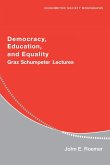Capabilities, Gender, Equality
Towards Fundamental Entitlements
Herausgeber: Comim, Flavio; Nussbaum, Martha C
Capabilities, Gender, Equality
Towards Fundamental Entitlements
Herausgeber: Comim, Flavio; Nussbaum, Martha C
- Broschiertes Buch
- Merkliste
- Auf die Merkliste
- Bewerten Bewerten
- Teilen
- Produkt teilen
- Produkterinnerung
- Produkterinnerung
Provides unique reflections on the capability approach and its relevance to new human development policies and political liberalism.
Andere Kunden interessierten sich auch für
![Democracy, Education, and Equality Democracy, Education, and Equality]() John E. RoemerDemocracy, Education, and Equality26,99 €
John E. RoemerDemocracy, Education, and Equality26,99 €![Fiscal Policies and Gender Equality Fiscal Policies and Gender Equality]() Fiscal Policies and Gender Equality36,99 €
Fiscal Policies and Gender Equality36,99 €![Gender Equality and Social Inclusion Diagnostic of Selected Sectors in Nepal Gender Equality and Social Inclusion Diagnostic of Selected Sectors in Nepal]() Asian Development BankGender Equality and Social Inclusion Diagnostic of Selected Sectors in Nepal44,99 €
Asian Development BankGender Equality and Social Inclusion Diagnostic of Selected Sectors in Nepal44,99 €![Gender Equality Results Case Study Gender Equality Results Case Study]() Asian Development BankGender Equality Results Case Study21,99 €
Asian Development BankGender Equality Results Case Study21,99 €![Reinventing African Chieftaincy in the Age of AIDS, Gender, Governance, and Development (New) Reinventing African Chieftaincy in the Age of AIDS, Gender, Governance, and Development (New)]() Reinventing African Chieftaincy in the Age of AIDS, Gender, Governance, and Development (New)44,99 €
Reinventing African Chieftaincy in the Age of AIDS, Gender, Governance, and Development (New)44,99 €![India Working India Working]() Barbara Harriss-WhiteIndia Working41,99 €
Barbara Harriss-WhiteIndia Working41,99 €![The Tortuous Path of South Korean Economic Development The Tortuous Path of South Korean Economic Development]() Jaymin LeeThe Tortuous Path of South Korean Economic Development38,99 €
Jaymin LeeThe Tortuous Path of South Korean Economic Development38,99 €-
-
-
Provides unique reflections on the capability approach and its relevance to new human development policies and political liberalism.
Produktdetails
- Produktdetails
- Verlag: Cambridge University Press
- Seitenzahl: 482
- Erscheinungstermin: 30. August 2018
- Englisch
- Abmessung: 229mm x 152mm x 25mm
- Gewicht: 640g
- ISBN-13: 9781108468831
- ISBN-10: 1108468837
- Artikelnr.: 52639290
- Herstellerkennzeichnung
- Libri GmbH
- Europaallee 1
- 36244 Bad Hersfeld
- gpsr@libri.de
- Verlag: Cambridge University Press
- Seitenzahl: 482
- Erscheinungstermin: 30. August 2018
- Englisch
- Abmessung: 229mm x 152mm x 25mm
- Gewicht: 640g
- ISBN-13: 9781108468831
- ISBN-10: 1108468837
- Artikelnr.: 52639290
- Herstellerkennzeichnung
- Libri GmbH
- Europaallee 1
- 36244 Bad Hersfeld
- gpsr@libri.de
Preface; Introduction: capabilities, challenges, and the omnipresence of
political liberalism Martha C. Nussbaum; Part I. The Capabilities Approach:
1. Perfectionist liberalism and political liberalism Martha C. Nussbaum; 2.
Rawlsian social-contract theory and the severely disabled Henry S.
Richardson; 3. Logos, pathos and ethos in Martha C. Nussbaum's capabilities
approach to human development Des Gasper; 4. Building capabilities: a new
paradigm for human development Flavio Comim; 5. Capabilities or
functionings? Anatomy of a debate Marc Fleurbaey; 6. From humans to all of
life: Nussbaum's transformation of dignity Jeremy Bendik-Keymer; Part II.
Gender: 7. Questioning the gender-based division of labour: the
contribution of the capabilities approach to feminist economics Ulrike
Knoblock; 8. Primary goods, capabilities, and the millennium development
target for gender equity in education Elaine Unterhalter and Harry
Brighouse; 9. The weight of institutions on women's capabilities: how far
can microfinance help? Muriel Gilardone, Isabelle Guérin and Jane Palier;
10. The capabilities of women: towards an alternative framework for
development Santosh Mehrotra; 11. Applying the capabilities approach to
disability, poverty, and gender Patricia Welch Saleeby; 12. Educational
transformation, gender justice and Nussbaum's capabilities Melanie Walker;
13. The social contract, unpaid child care and women's income capability
Hilde Bojer; Part III. Equality: 14. Lists and thresholds: comparing the
Doyal-Gough theory of human need with Nussbaum's capabilities approach Ian
Gough; 15. Nussbaum, Rawls, and the ecological limits of justice: using
capability ceilings to resolve capability conflicts Breena Holland; 16.
Social justice and Nussbaum's concept of the person John M. Alexander; 17.
God and Martha C. Nussbaum: towards a Reformed Christian view of
capabilities Jonathan Warner; Index.
political liberalism Martha C. Nussbaum; Part I. The Capabilities Approach:
1. Perfectionist liberalism and political liberalism Martha C. Nussbaum; 2.
Rawlsian social-contract theory and the severely disabled Henry S.
Richardson; 3. Logos, pathos and ethos in Martha C. Nussbaum's capabilities
approach to human development Des Gasper; 4. Building capabilities: a new
paradigm for human development Flavio Comim; 5. Capabilities or
functionings? Anatomy of a debate Marc Fleurbaey; 6. From humans to all of
life: Nussbaum's transformation of dignity Jeremy Bendik-Keymer; Part II.
Gender: 7. Questioning the gender-based division of labour: the
contribution of the capabilities approach to feminist economics Ulrike
Knoblock; 8. Primary goods, capabilities, and the millennium development
target for gender equity in education Elaine Unterhalter and Harry
Brighouse; 9. The weight of institutions on women's capabilities: how far
can microfinance help? Muriel Gilardone, Isabelle Guérin and Jane Palier;
10. The capabilities of women: towards an alternative framework for
development Santosh Mehrotra; 11. Applying the capabilities approach to
disability, poverty, and gender Patricia Welch Saleeby; 12. Educational
transformation, gender justice and Nussbaum's capabilities Melanie Walker;
13. The social contract, unpaid child care and women's income capability
Hilde Bojer; Part III. Equality: 14. Lists and thresholds: comparing the
Doyal-Gough theory of human need with Nussbaum's capabilities approach Ian
Gough; 15. Nussbaum, Rawls, and the ecological limits of justice: using
capability ceilings to resolve capability conflicts Breena Holland; 16.
Social justice and Nussbaum's concept of the person John M. Alexander; 17.
God and Martha C. Nussbaum: towards a Reformed Christian view of
capabilities Jonathan Warner; Index.
Preface; Introduction: capabilities, challenges, and the omnipresence of
political liberalism Martha C. Nussbaum; Part I. The Capabilities Approach:
1. Perfectionist liberalism and political liberalism Martha C. Nussbaum; 2.
Rawlsian social-contract theory and the severely disabled Henry S.
Richardson; 3. Logos, pathos and ethos in Martha C. Nussbaum's capabilities
approach to human development Des Gasper; 4. Building capabilities: a new
paradigm for human development Flavio Comim; 5. Capabilities or
functionings? Anatomy of a debate Marc Fleurbaey; 6. From humans to all of
life: Nussbaum's transformation of dignity Jeremy Bendik-Keymer; Part II.
Gender: 7. Questioning the gender-based division of labour: the
contribution of the capabilities approach to feminist economics Ulrike
Knoblock; 8. Primary goods, capabilities, and the millennium development
target for gender equity in education Elaine Unterhalter and Harry
Brighouse; 9. The weight of institutions on women's capabilities: how far
can microfinance help? Muriel Gilardone, Isabelle Guérin and Jane Palier;
10. The capabilities of women: towards an alternative framework for
development Santosh Mehrotra; 11. Applying the capabilities approach to
disability, poverty, and gender Patricia Welch Saleeby; 12. Educational
transformation, gender justice and Nussbaum's capabilities Melanie Walker;
13. The social contract, unpaid child care and women's income capability
Hilde Bojer; Part III. Equality: 14. Lists and thresholds: comparing the
Doyal-Gough theory of human need with Nussbaum's capabilities approach Ian
Gough; 15. Nussbaum, Rawls, and the ecological limits of justice: using
capability ceilings to resolve capability conflicts Breena Holland; 16.
Social justice and Nussbaum's concept of the person John M. Alexander; 17.
God and Martha C. Nussbaum: towards a Reformed Christian view of
capabilities Jonathan Warner; Index.
political liberalism Martha C. Nussbaum; Part I. The Capabilities Approach:
1. Perfectionist liberalism and political liberalism Martha C. Nussbaum; 2.
Rawlsian social-contract theory and the severely disabled Henry S.
Richardson; 3. Logos, pathos and ethos in Martha C. Nussbaum's capabilities
approach to human development Des Gasper; 4. Building capabilities: a new
paradigm for human development Flavio Comim; 5. Capabilities or
functionings? Anatomy of a debate Marc Fleurbaey; 6. From humans to all of
life: Nussbaum's transformation of dignity Jeremy Bendik-Keymer; Part II.
Gender: 7. Questioning the gender-based division of labour: the
contribution of the capabilities approach to feminist economics Ulrike
Knoblock; 8. Primary goods, capabilities, and the millennium development
target for gender equity in education Elaine Unterhalter and Harry
Brighouse; 9. The weight of institutions on women's capabilities: how far
can microfinance help? Muriel Gilardone, Isabelle Guérin and Jane Palier;
10. The capabilities of women: towards an alternative framework for
development Santosh Mehrotra; 11. Applying the capabilities approach to
disability, poverty, and gender Patricia Welch Saleeby; 12. Educational
transformation, gender justice and Nussbaum's capabilities Melanie Walker;
13. The social contract, unpaid child care and women's income capability
Hilde Bojer; Part III. Equality: 14. Lists and thresholds: comparing the
Doyal-Gough theory of human need with Nussbaum's capabilities approach Ian
Gough; 15. Nussbaum, Rawls, and the ecological limits of justice: using
capability ceilings to resolve capability conflicts Breena Holland; 16.
Social justice and Nussbaum's concept of the person John M. Alexander; 17.
God and Martha C. Nussbaum: towards a Reformed Christian view of
capabilities Jonathan Warner; Index.









